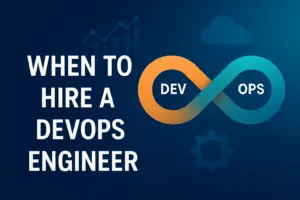When to Hire a DevOps Engineer: The Strategic Tipping Point
Executive Summary
Hiring a full-time DevOps engineer isn’t just a technical decision—it’s a strategic milestone. This article breaks down the critical signs that your organization is ready to bring DevOps in-house, the risks of waiting too long, and how to align this hire with business outcomes like velocity, uptime, and risk mitigation.
Introduction: When to Hire a DevOps Engineer
DevOps has become a cornerstone of modern software delivery. But knowing when to invest in a dedicated DevOps engineer often sparks debate.
Is it a matter of scale? Technical complexity? Release velocity?
In reality, it’s all of the above—plus a few business signals that often go unnoticed. In this post, we unpack what those signals look like, how to evaluate your readiness, and why getting the timing right can accelerate everything from developer productivity to customer satisfaction.
The Business Context: More Than Just Pipelines
DevOps isn’t a role you fill to tick a box. It’s a multiplier for your entire software organization.
When you reach a point where outages, release delays, or mounting technical debt start impacting customer experience or business goals, that’s your cue. It’s not just about having someone write Terraform or monitor CI/CD pipelines—it’s about instilling operational maturity.
Symptoms You’re Flying Too Close to the Sun
- Your developers are spending 30%+ of their time maintaining infra or tooling.
- Releases feel chaotic or fragile.
- You’re experiencing frequent outages with unclear postmortems.
- Security patches or compliance audits are causing fire drills.
- Your cloud bill keeps rising without clear accountability.
💡 Think of DevOps as your product’s pit crew—they keep everything running smoothly so your team can stay in the race.
The Technical Trigger Points: Indicators You Need a DevOps Engineer
Here are some common inflection points where a full-time DevOps engineer becomes not just helpful, but essential:
1. Scaling from MVP to Production
Early-stage teams often bootstrap infrastructure. But once you’re serving real users, uptime and performance become business-critical.
2. Multi-Environment Management
If you’re juggling staging, QA, production, and feature preview environments, you’re already in DevOps territory.
3. Compliance and Security Needs
HIPAA? SOC 2? ISO 27001? These aren’t just checkboxes. They require disciplined control over infra, access, and deployment practices.
4. Developer Onboarding is Painful
If it takes more than a day to get a dev up and running, that’s a DevOps red flag.
🗣️ For non-technical execs: DevOps helps automate and secure your tech stack, just like good accounting software does for your finances.
Strategic Recommendations for Hiring DevOps Talent
So how do you make the call?
Start with a readiness assessment. Ask:
- What percentage of your dev time is spent on non-feature work?
- How often do releases break?
- Do we have clear ownership of infra and pipeline issues?
- Are we confident in our security posture?
If you’re answering “not sure” or “too often,” it’s time to act.
Consider starting with a contractor or fractional hire if you’re still in transition. But once you’re in active scaling mode—especially post-Series A or when handling customer SLAs—a full-time DevOps hire brings long-term stability.
Hiring Profiles to Consider
- Platform Engineer: If you’re scaling multiple services or microservices.
- Site Reliability Engineer (SRE): If uptime and monitoring are mission-critical.
- Security-Focused DevOps: If compliance or enterprise customers are on the horizon.
Internal: Hiring a DevOps Engineer: What Tech Leaders Need to Know
ROI: What You Gain by Hiring Now
A full-time DevOps engineer brings:
- Faster, safer releases through CI/CD automation
- Improved uptime via observability and incident response
- Cost control through better cloud resource management
- Happier developers who spend more time building features, not fighting fires
Case in Point
A mid-sized SaaS startup we worked with hired their first DevOps engineer after a string of outages hurt customer trust. Within 3 months:
- Release time dropped by 40%
- Uptime improved from 97.9% to 99.95%
- Cloud spend dropped 15% through rightsizing and automation
Conclusion: Is It Time to Hire a DevOps Engineer?
Hiring a DevOps engineer isn’t just a tactical move—it’s a sign your business is maturing. It means you’re prioritizing reliability, velocity, and the long-term health of your engineering org.
If you’re seeing the signs, don’t wait. The right hire can free your devs, calm your ops, and unlock the next stage of growth.
Let’s talk about how your DevOps strategy aligns with business outcomes.

